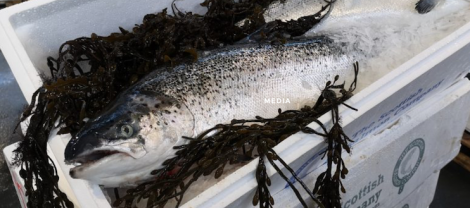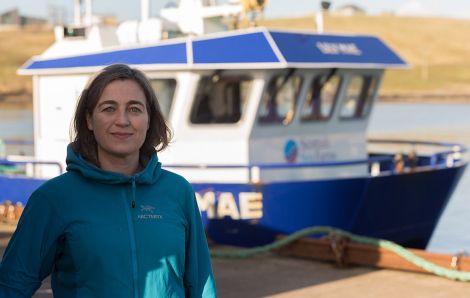Brexit / Salmon industry to be hit by financial and bureaucratic burden
But industry also confident that trade will continue after Brexit
THE SALMON farming industry has warned it could be hit by a “huge unnecessary burden” when the free movement of goods between the UK and the European Union potentially ends on 31 December 2020.
The Scottish Salmon producers Organisation (SSPO) is calling on the UK Government to stay aligned with the EU on seafood exports after the end of the transition period as otherwise it would be inevitable for exports to Europe to require Export Health Certificates (EHC).
The SSPO estimates that in financial terms the additional cost of this would be between £1.3 million and £8.7 million per year depending on the amount charged by councils for each EHC.
In bureaucratic terms, it could mean the processing and signing of an extra 50,000 to 100,000 EHCs every year, each one of which has to be signed by either an environmental health officer or a vet.
A third of the industry’s exports, worth around £190 million, currently goes to France, the trade body said.
Representatives of the local industry – Shetland accounts for around a third of Scottish salmon – said government needed to do everything possible to minimise any negative impact on the industry.
Export Health Certificates for Scottish salmon exports may well be issued at the DFDS distribution hub at Larkhall, in Lanarkshire, rather than by the local authorities such as Shetland Islands Council (SIC).
The SIC’s environmental health team leader David Robertson said discussions are ongoing between Food Standards Scotland, the Animal & Plant Health Agency and local authorities with a view to having all EHCs processed centrally.
“It is still early days but hopefully we can avoid the situation whereby Shetland Island Council EHOs [environmental health officers] would have to issue every EHC at source,” he said.
Other seafood producers such as the shellfish industry are understood to require export health certificates issued by the SIC.
Become a member of Shetland News
The salmon industry is also calling on the government to negotiate for the continued tariff-free access to the EU for Scottish salmon after the end of the transition period.
SSPO chief executive Julie Hesketh-Laird said farmed salmon was the UK’s biggest food export.
“The addition of an Export Health Certificate for every order of salmon to the EU would place huge unnecessary financial and bureaucratic burdens on our sector – potentially undermining one of the UK’s biggest modern export success stories,” she said.
“About 300 salmon orders are dispatched to the EU every day by road and through the Channel Tunnel.
“If each one – or even each lorry load – had to have an extra certificate, signed by a vet or an environmental health officer, it would not only add delays and cost to Scottish salmon exports, it would give our international competitors an advantage they would be unlikely to pass up.
“We are appealing to the UK government to make this a priority in negotiations with the EU.
“We want both sides to commit to allow seafood trade to the EU to continue as it now, without the imposition of any new tariff or non-tariff barriers and we want UK ministers to call for this in negotiations.”
A spokesman for Cooke Aquaculture said the company exports the majority of its Scottish salmon, farmed in Shetland and in Orkney, to the EU and that it did not expect that to change after the transition period.
“What might change, however, is the export arrangements. The introduction of EU tariffs and non-tariff barriers including new requirements for Export Health Certificates could add significant costs, bureaucracy and delays which is in no-one’s interests,” he said.
“Whatever the outcome of negotiations on the future relationship with the EU, the Scottish and UK governments need to do everything possible to streamline the process to ensure Scottish salmon holds on to the top spot as the UK’s number one food export and European consumers can continue to enjoy our world-renowned product.”
Grieg Seafood Shetland managing director Grant Cumming meanwhile said his company was only exporting a small proportion of its production to the EU.
“From Grieg’s perspective, we obviously want trade with the EU to be as frictionless as possible but we are confident that we will be able to work with whatever system is put in place,” Cumming said.
“It may of course add cost to the final product however. We remain confident that there is a strong market for Shetland and Scottish salmon and that sales will continue to be strong after Brexit is complete.”
Become a member of Shetland News
Shetland News is asking its many readers to consider paying for membership to get additional features and services: -
- Remove non-local ads;
- Bookmark posts to read later;
- Exclusive curated weekly newsletter;
- Hide membership messages;
- Comments open for discussion.
If you appreciate what we do and feel strongly about impartial local journalism, then please become a member of Shetland News by either making a single payment, or setting up a monthly, quarterly or yearly subscription.































































